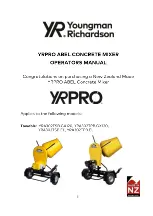
Lucent Technologies Lineage
®
2000 200A Ferroresonant Rectifier J85503B-2
Issue 8 January 1999
Product Description 2 - 1
2
Product Description
General
In most telecommunications applications, the output of the
rectifier system is electrically connected in parallel with the
batteries. The rectifiers provide both the power to the telephone
equipment through the plant distribution and the charging and
float current to the batteries. In the event of commercial power
failure, the batteries supply the required dc power to the
telephone equipment. This transition needs no switching
because of the parallel connection of the rectifiers and batteries.
Typical Battery
Plant
Figure 2-1 shows a basic block diagram of a typical dc battery
plant. The battery plant accepts alternating current from the
commercial utility or a standby ac power source and rectifies it
to produce dc power for the using equipment. The plant’s control
and alarm functions interact with the rectifiers and the office. In
addition, the plant provides overcurrent protection, charge,
discharge, and distribution facilities. Battery reserve
automatically provides a source of dc power if the commercial
or standby ac fails. This battery reserve is engineered to supply
dc power for a specific period of time. In normal practice, battery
capacity is sized to provide 3 to 8 hours of reserve time.
Battery Plant
Subsystems
AC Input: connects the commercial and/or standby ac power
sources to the rectifiers within the plant and provides
overcurrent protection. This subsystem is usually supplied by
the customer.
Rectifiers: convert an ac source voltage into the dc voltage level
required to charge and float the batteries and to power the using
equipment.
















































